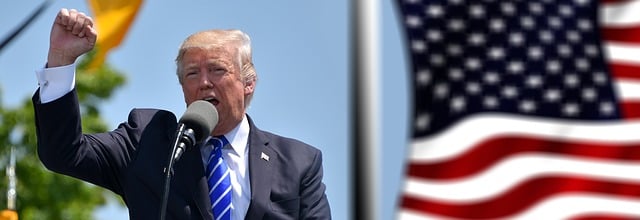How to Write about a Trump-like Leader

Many writers and political observers have said being objective about former President Donald Trump is impossible. He’s such a divisive leader you must be for him or against him, they claim, implying that one’s subjective feelings are the equivalent of a circuit breaker in a house that overrides all other power sources such as reason and judgment. I say they are wrong.
Not long ago I read the late David Brinkley’s last collection of essays, Brinkley’s Beat. Perhaps the best essay was on organized labor leader Jimmy Hoffa. Today, Mr. Hoffa is best known for his mysterious disappearance in 1975 and Al Pacino’s portrayal of him in the 2019 film The Irishman. In his heyday in the mid-twentieth century, though, Jimmy Hoffa was like Donald Trump.
The Trump of your grandfather’s era
He was a national leader whom millions of ordinary Americans adored and many elites despised, including not only Bobby Kennedy but also federal law enforcement, whose efforts resulted in Mr. Hoffa being sent to federal prison for mail and wire fraud and conspiracy. (Whether either man was a flat-out demagogue or near-demagogue is another question).
If you drew up a list of writers who would seek to understand Mr. Hoffa, David Brinkley would be toward the bottom. He grew up in the South at a time when labor unions were much weaker than in the rest of the country and was a longtime network television anchor for NBC. Given this background, you might expect that Mr. Brinkley would savage Mr. Hoffa as a corrupt rogue. He didn’t do that, though.
Two insights from unlikely honest broker
Mr. Brinkley sought to understand Mr. Hoffa, whom he interviewed at length on camera in 1963. His first insight was that Mr. Hoffa understood his followers, the Teamsters. Mr. Hoffa did more than deliver material benefits such as union jobs and benefits, Mr. Brinkley notes. He articulated their emotional and spiritual outlook about politics and society:
Hoffa told me he thought life was a jungle, and for many people—including many members of his own union—it was. In the jungle, everyone is out for himself, and the most people can hope for is to find someone smarter and stronger than they are to help them fight off their enemies. To those people, Hoffa was a leader who knew the jungle, who knew how to fight in it, and who knew who his friends were, and, at least as important, who his (and their) enemies were. A leader can survive a great deal, at least for a time, if he has the ability and the shrewdness to exploit his problems and turn them into assets.
Mr. Brinkley’s second insight built on his first: Mr. Hoffa rallied millions of Americans because of not despite his amorality. His oath was not to the Constitution, a church, or an ethical system. It was to his union followers. As Mr. Brinkley noted,
Hoffa knew how to make use of the attacks leveled against him. He turned them into evidence of the world his supporters shared. People were out to get him, he made them believe, because they were afraid of being gotten themselves. Morality had nothing to do with it. The law had nothing to do with it. It was self-interest against self-interest, and the toughest guy would win. And Hoffa was the toughest guy around—for a while.
This second insight is deeper than you might think. Certainly, I, as the author of a book on the Democratic Party’s historical conflict between cultural liberals and Catholic and working-class voters, appreciated that some leaders are more loyal to their faction than the law, party, or morality.
The soul of a Trump-like leader
Yet I had not appreciated that some leaders act as if loyalty to their faction is separate or divorced from law and morality. This made me see, and perhaps you too, Mr. Trump in a new light. As a politician, he views his ultimate loyalty to his faction, not to representative democracy, or the Constitution. That helps explain his baseless claims of massive election fraud that prevented him from winning the 2020 election.
To be sure, many writers and reporters have written about Mr. Trump with nuance and insight and uncovered revelations about his political and business dealings. Yet unless I missed something in the last six years (and maybe I have!), no writer has written about Mr. Trump with near-total objectivity, which is to say a lack of personal feeling and belief. Never did I conclude after reading an article or story that I grasped the soul of the man and the heart of his social and political appeal.
Mr. Brinkley was objective toward Mr. Hoffa, though. His personal view of Mr. Hoffa was mixed. He acknowledged after interviewing Mr. Hoffa he was both “strangely impressed and deeply repelled.”
How detachment begets truth
You can ascribe Mr. Brinkley’s objectivity to many factors. For example, Mr. Hoffa was never President and Mr. Brinkley wrote his essay at a remove of many years. Yet Mr. Brinkley’s detachment from his subjects offers the best lesson for writers today. He was an umpire or referee rather than a player of the game. As he wrote,
although much of what I covered over the years was serious, and even tragic, I tried never to lose sight of the pretension and folly that was always there, even in the gravest situations. In the troubled times in which I have finished this book, I think it’s still important to be a little detached, to keep an eye out for the foolish and the ridiculous, and to avoid accepting everything at face value.
No matter your race, sex, age, or religion, being a “little detached” from your subject matter is a mark of a true writer.
What does everybody think?
-30-

I think detachment is indeed a true virtue! Yet. The economics of an industry no longer drawing big advertising dollars but instead needing partisans willing to pay for subscriptions could mean the structure to support it may simply not be there….
And that’s ignoring that detachment may not be possible during wars which require a winner and a loser, even when they are culture wars.
More difficult but impossible?
The virtuous can make the effort, but money and the will to win will pull most out of even trying. It’s correct to strive for virtue, but recognizing that you cannot win is part of wisdom and prudence.
Traditional objective journalism won’t work when one party or leader uses the norms of democracy to attack and undermine democracy. Hoffa was lawless, but there were those who held him accountable [i.e. Robert Kennedy, DOJ,] etc. Trump exploits “bothsideism” to move forward with an anti-democratic agenda and a history of law breaking in high office that so far he’s escaped. Hoffa would surely envy what Trump got away with. a Better way to understand and write about Trump is put him an American and historical context, as Ruth Ben Ghiat does in her look at century of authoritarian leaders, “Strongmen.” That’s a challenge that respectful but critical tone of a Brinkley wouldn’t work in today’s climate?